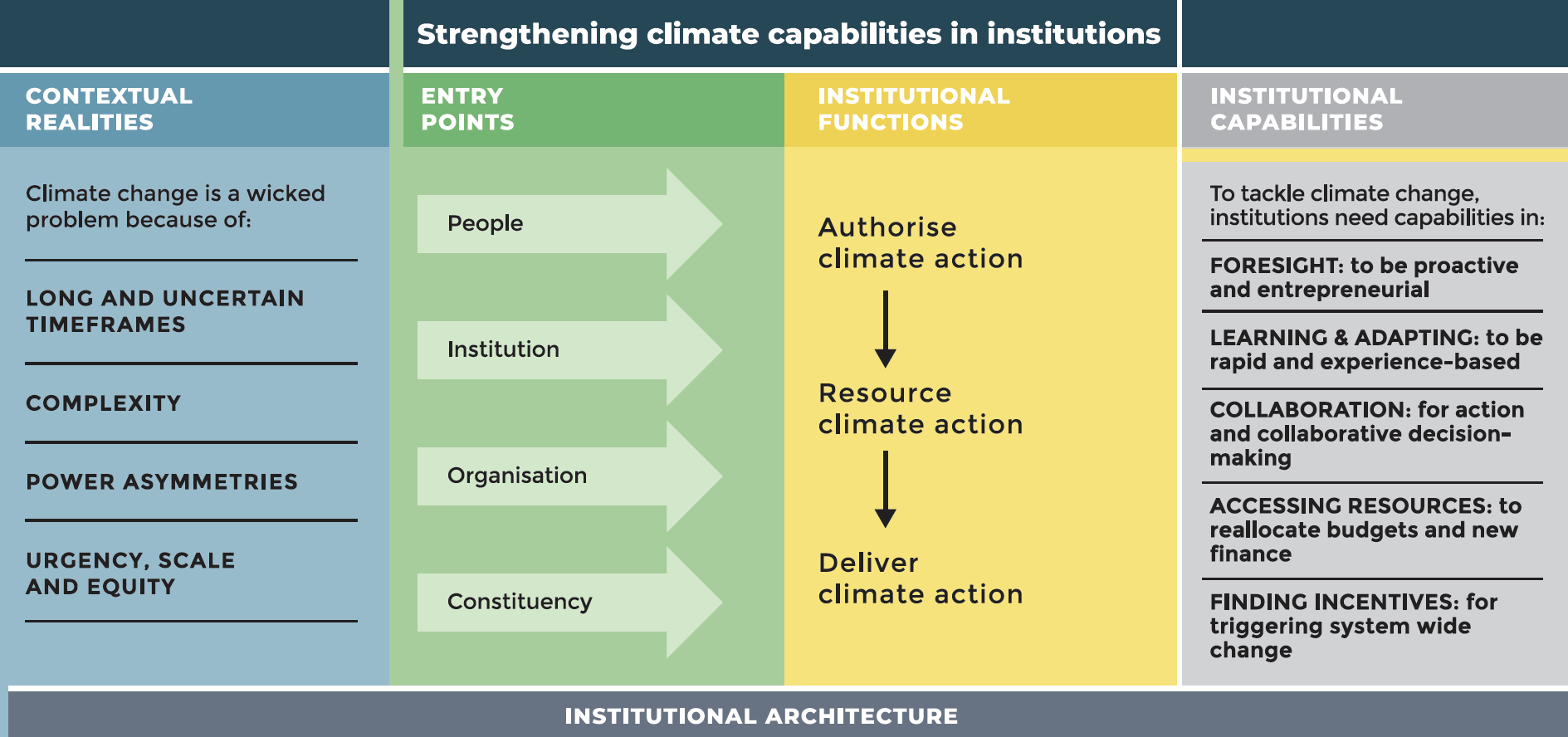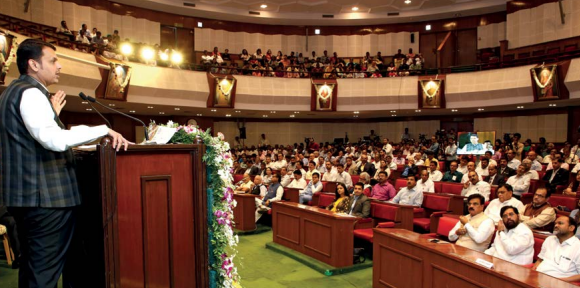Building institutional capacity for enhancing resilience to climate change: An operational framework and insights from practice

Introduction
This paper* focuses on the challenge of strengthening institutions’ capacity to understand and address the impacts of climate change on development. It offers insights from practical experience from the Action on Climate Today (ACT) programme and introduces a framework for building capabilities that can inform initiatives seeking to enhance adaptation across different contexts.
The ACT programme is helping mainstream climate change resilience measures within budgetary planning and policy-making across South Asia. The programme aims to improve resilience by directly incorporating climate change considerations into policy, planning and investment environments within five countries in the region: Afghanistan, Bangladesh, India, Nepal and Pakistan, as well as six states in India.
The urgent need for governments to build resilience has frequently led to a reliance on short-term and ad hoc efforts to boost capacity. International organisations are ‘parachuted’ into developing countries to provide one-off training sessions and workshops. Such support has limited impact, sustainability is low and institutional capacity to deal with climate change often remains nascent.
The paper introduces a framework for strengthening institutional climate capabilities to guide those designing, planning and delivering other programmes and initiatives. This framework offers a comprehensive approach to thinking through how to engage individuals, organisations and the wider systems that create incentives – the processes, resources, norms and values of institutions. The framework was derived from ACT’s most successful experiences in building institutional capacity and is informed by wider literature on governance, climate change and organisational development.
Listen to the author’s audio abstract for the paper
*Download the full paper from the right-hand column and access the paper brief from the link below.
Key Findings
Climate capabilities and context
- The framework proposes a set of characteristics that institutions should possess in order to overcome the unique challenges involved in responding to climate change:
- they must be able to act on foresight,
- learn and adapt,
- build collaborative coalitions for action,
- access resources and
- use incentives to trigger change.
- These characteristics aim to reframe understanding capacity-building – away from the institutional architecture, policies and plans to consider the actual performance and behaviour of institutions.
Entry points
- The framework then considers how programmes can build these capabilities.
- It introduces the entry points through which capacity-building can be delivered:
- the people,
- organisations,
- the informal norms set by institutions and
- the wider constituency of partners that shape debates and advise governments.
- The paper considers how ACT’s formal and informal approaches have been used to engage with these different levels.
- This highlights the importance of ACT’s local teams building trusted relationships, being responsive while keeping a sharp eye on the longer-term strategy – including thorough regular analysis of the political context and measuring progress against defined competencies.
Institutional functions
- The central part of the framework sets out pathways to building climate capabilities around the core functions of institutions: authorising, resourcing and delivering climate action.
- These pathways are explained through ACT’s most significant success stories of strengthening these institutional functions and considering what was distinct from less successful experiences. This illustrates the value of ACT’s flexible and responsive approach that is able to seize political opportunities for change when and where they emerge.
- It also highlights the importance of engaging the external actors and local experts who are already credible in undertaking the technical analysis – building their capabilities to continue to support the government’s response to climate change and creating an informed external constituency for action.
- It demonstrates the value of patience and continuous support – responding to the stop-start pace of local actors and mentoring post training or after sharing a new piece of analysis – to help individuals consolidate new skills and knowledge.
- By considering the range of functions together, the programme has supported improvements in its partner institutions’ functional performance – but also identified where more attention is needed.
Institutional architecture
- The framework emphasises that institutional capacity should focus on function rather than form, and as such the institutional architecture is shown as the bedrock for authorising, resourcing and delivering climate action.
- It seeks to emphasise the value of different design options for functional performance.
- The framework unpacks the trade-offs between different designs – using ACT’s experience to highlight how understanding the constraints of any single design can ensure there is attention to building sufficient accountability to counteract these constraints.
Lessons Learnt
Lessons from ACT that cut across the framework highlight that the programme is different from traditional linear, largely pre-planned, initiatives. In particular, its flexible delivery model makes it possible to tackle reform areas not initially anticipated as they emerge on the political agenda. Some of the lessons highlighted in the paper include:
1. Build a shared vision: Through dialogue and careful choices of political entry points, a common vision for tackling climate change can be built within an institution to shift dominant narratives on development.
2. Learn and adapt:Recognise that an iterative, context-specific approach that tolerates unpredictability and occasional failure is key to institutional reform in an uncertain environment.
3. Invest in ‘influencing’ and local teams:Build, support and then trust the intuition of the local team to seize opportunities, which is crucial to sustaining government partners’ ownership.
4. Expect resistance and diffuse opposition:Recognise that change challenges the status quo; support partners to see how climate change links to their priorities, and engage those whose interests might be jeopardised to look for new opportunities.
5. Build the constituency for delivering climate action:Develop the external network around government to provide new avenues for discussion and debate on climate change to constructively impact public policy.
6. Have a strategy and budget time:Focus on the clearly defined end goals of improved functional performance in a particular area, and respond to opportunities to contribute to them.
7. Avoid technical bias when building climate change capabilities:The ‘soft’ skills of leadership and finding the right incentives help government partners should incorporate new technical information and skills.
8. Measure the right things:Flexibility of approach requires flexibility of measurement from donors. Qualitative indicators that chart capacity-building may be more effective than counting numbers of people trained in a particular skill.
9. Reshape interests:New evidence and analysis, new incentives and conscious agreements can reshape interests to recognise and drive forward climate action.
Suggested citation
Shakya, C., Cooke, K., Gupta, N., Bull, Z., and Greene, S., 2018. Building institutional capacity for enhancing resilience to climate change: An operational framework and insights from practice. ACT Learning Paper. Available online here.
Further reading
- Other ACT briefs:
- Related reading:

(0) Comments
There is no content